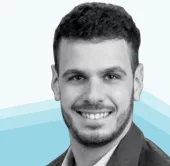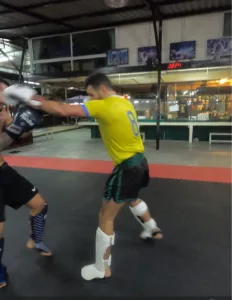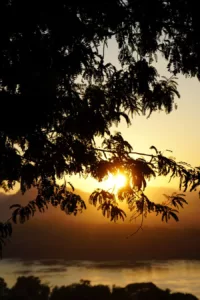Extraordinary Sabbatical

Interview with our colleague Manuel Klein

““The option of a sabbatical should ideally be part of every working model. I think that’s important to our generation. But I know that Pitzek is one of the exceptional companies here.”“, says Manuel Klein, Project Engineer, Pitzek GMP Consulting.

The word “Sabbath” comes from the Hebrew and refers to the seventh day of the week when no work is to be done and rest is to be taken. A mini-break, so to speak. Later it was even applied to the university context. Every seventh year, researchers were allowed to take a break from university life and devote themselves to their own research projects. The sabbatical itself is a working model for a longer period of special leave. As a modern company, we promote NEW WORK and the time off it offers our employees. Of course, this is assessed on an individual basis and must also be compatible with work. This brings us to the first question.
Pitzek:
Hello Manu, you once called your sabbatical a “modern sabbatical”. This could be a classic sabbatical year, unpaid special leave, time off, a gap year between A-levels and university or something similar. The term is pretty open.
What do you mean by that?
Manuel:
I see it primarily as an opportunity to broaden my horizons, not as an extended holiday to escape my problems. Some personal projects require more time than statutory or contractual annual leave, and a ‘modern sabbatical’ is great for that.
Pitzek:
What motivated you to take a sabbatical?
Manuel:
A thirst for adventure and wanderlust. Travelling has fascinated me for as long as I can remember and, if you can call it that, it’s also a passion for me. In the evenings, I often find myself on Google Maps studying countries, watching wildlife documentaries or playing a travel and geography quiz with my girlfriend.
During the coronavirus pandemic, I drew up a bucket list of things I still want to experience and see in my life. There was also a list for travelling. This included, among other things: Volunteering in a developing country or getting a diving licence and diving with sharks and much more.
When travelling was possible again without restrictions and one of the items on my bucket list just fitted in with the workload of my project, I jumped at the chance. After a few discussions with the management, it was clear that it was possible and I could go on my personal journey.
Pitzek:
The pictures speak volumes. Nevertheless, the question “Why Asia”?
Manuel:
There are several routes around the world on my bucket list. Central America and Africa in particular, which I would also have been very interested in. The nice thing is that the other routes don’t travel by themselves!
I was in Indonesia at the start of the pandemic, but then had to cut my trip short prematurely, so I still had unfinished business. Asia offers beautiful landscapes, delicious mangoes (I remember them) and lots of adventures.
Pitzek:
What inspired you the most there?
Manuel:
I was most impressed by the simplicity of things. Life is not simpler in terms of living conditions, but in terms of approaches. Moving with a lorry, van and 3 helpers? No! Everything with your own Honda Wave (scooter). People in Laos, Vietnam and the Philippines, for example, were not familiar with the phrase “wasting time”.
Of course, I was thrilled by the spectacular sunsets. But what really thrilled me was something that I hadn’t expected or even looked for. The reflection of my “ordinary” everyday life and the acceptance that things simply work differently in some places and that this is okay. I am very grateful for my background and all the opportunities I have been given in my life. It has helped me to understand a lot of things and push my cultural understanding forward.
Apart from that, a video I received from my colleagues singing for me at the Christmas market made me very happy. They told me how much they missed me. That really touched me.
Pitzek:
Which countries have you travelled to?
Manuel:
The order in which I travelled was something like this: Indonesia – Thailand – Laos – Philippines – Vietnam – India.
Pitzek:
Wow, that sounds really exciting, which state do you remember the most and why?
Manuel:
Of course I remember an incredible number of things, so I’ll just say a few words about each country.
Indonesia: I did a lot of yoga here, especially acro yoga (acro for acrobatics) with my girlfriend. It was extraordinary in the jungle atmosphere. We also climbed a volcano at sunrise and had breakfast there with our guide and held a small Hindu ceremony.
Thailand: As a long-time martial artist, there was of course one thing on the programme: Muay Thai! (Thai boxing). Hard training in almost saturated air and afterwards a delicious Pad Thai with Chang beer. I learnt a lot about the sport and the practitioners. It was as exciting as it was exhausting. A Thai boxing afterwork session was of course unavoidable.
Laos: Teaching at the Transformation Centre in Vientiane, of course. More on this later.
Philippines: Where do I start? With the aim of seeing whale sharks in Donsol, we took a tricycle (similar to a tuk-tuk) to the diving centre. The vehicle was designed for 3 people, five of us, me suddenly at the wheel, the actual driver on the roof. I’ll be brief: the clutch was preterite, the brakes were as effective as Jägermeister on a hangover and I was suddenly totally overwhelmed – bang! Suddenly there were onlookers everywhere and I was in shock in my bright yellow T-shirt (recognisable “laughs”). In the end everything went well, I just thought everyone in Donsol would know what had happened in the days that followed. We also celebrated Christmas with the “locals” in the Philippines and I went diving with thresher sharks in Malapascua. Great experiences.
Vietnam: Motorbike tour through the north of Vietnam. It was very adventurous, right up to the border with China. Very exciting and picturesque landscapes.
India: Clearly, tiger safari in Rajasthan. After 5 days I was finally lucky enough to see the young female T-41 Laila walking about 2 metres next to me. What a beautiful animal.
Pitzek:
What special experiences did you have there or where were you particularly involved?
Manuel:
I was particularly involved in Laos. I worked there for two weeks as an English teacher in a transformation centre. The Transformation Centre is a school for teenagers and young adults who have or have had problems with drugs and are being put back on the right track there. The centre consists of a school building, dormitories and a small farm with goats, chickens, a catfish tank and a vegetable garden. Everything is very rudimentary.
The English lessons weren’t quite so easy, as I don’t speak Lao and don’t know the script either. But with our hands, feet and Google Translator, we managed to overcome the hurdles together. The great thing was the mix of teaching, sport and living together with the boys. Even if we weren’t able to have a good and intensive conversation, we still understood each other without a lot of words and had a lot of fun together. I learnt a lot there and hopefully they learnt a lot from me too. It really was a wonderful experience that I would never want to have missed.
One small thing: they had lots of small Siamese fighting fish in little jars. I took the fish and released them in the pond while the rest of the lesson began.
Pitzek:
Let’s take a look at our company. Not every company offers the opportunity to take a longer break. As a medium-sized company, Pitzek GMP Consulting is very progressive in the area of “New Work” and open to new approaches. are such working models important for your generation?
Manuel:
First of all, I am very grateful to have had this opportunity. In discussions with other travellers, there was always a lot of admiration for my employer for allowing me to do this. I would also like to say a big thank you to my colleagues who stood in for me during this time.
By definition, I belong to Generation Y. According to my research (Chat GPT), flexibility at work, education and lifelong learning as well as work-life balance are important to them. Now I can’t speak for one generation. I think it’s important to pursue your dreams and have an open dialogue with yourself and your environment. This also includes your employer. I am very happy that we at Pitzek GMP Consulting have the opportunity to realise something like this after consultation. I have a good relationship with my superiors and so it was no problem to simply go to our Managing Director’s office and discuss it with him. His door is always open! “The option of a sabbatical should ideally be part of every working model. I think that’s important to our generation. But I know that Pitzek is one of the exceptional companies here.” In my opinion, a modern sabbatical is only feasible if it is also economically viable – for both employer and employee. Of course, if you are in the middle of a busy, challenging project, such a sabbatical is more difficult to realise, and you should always be aware of that. It was just the perfect fit for me!
Pitzek:
Thank you very much for the flowers, and it’s great for the company to hear that. OK, to summarise, you had an incredible number of adventures and learned a lot about other cultures and your own self. It’s definitely an experience for life.
Thank you very much for the fascinating interview, Manuel!
Conclusion Pitzek:
We know exactly the same Manuel as an employee and colleague. We value you as very loyal, helpful, polite, caring, passionate and with the necessary mischief in your neck! We’ve never seen you in a really bad mood – on the contrary, we know you as a cheerful person and you can see your thirst for adventure when we look into your smiling eyes.
